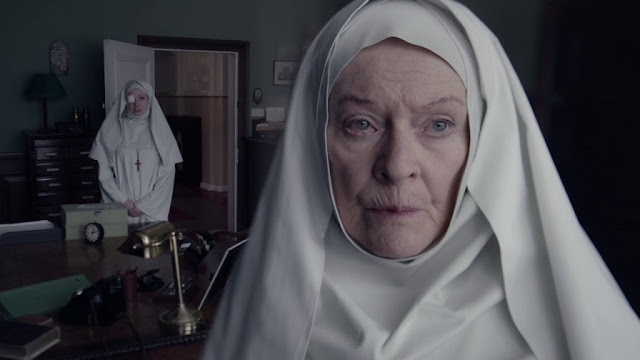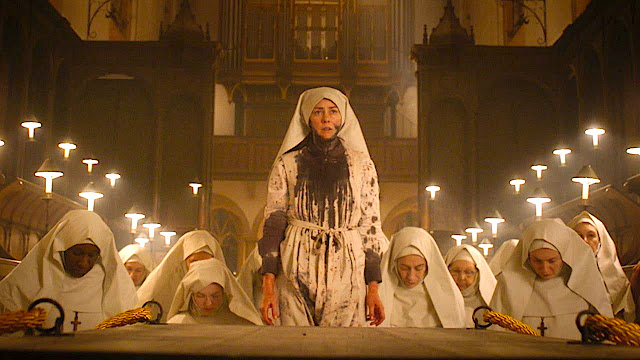As a someone who was raised Catholic, I think almost all religious films, and religions, are scary. My take is that Catholicism is a cult just like any other, and the Pope and his cadre of guys are the cult's leadership. I'm also a pretty big fan of Jenna Malone, the star of Christopher Smith's latest horror thriller, Consecration (2023), so ignoring the disappointed and disappointing reviews of the film, I jumped right in. Grace (Jenna Malone) is a hardworking ophthalmologist trying to help her patients
In the first few minutes of Consecration, Grace is walking down a London street when suddenly a nun in a pristine white habit points a gun at her...fade to black. I like this beginning. Call me intrigued and ready for more! Switching to the present day, Grace is meeting with a blind woman and her husband, and suggests that there is a way to bring her sight back. She then receives a phone call that her brother, a priest named Michael, was involved in what the police believe is a murder/suicide at a Scottish convent. Grace doesn't believe that Michael could kill someone, let alone himself, and goes to the Mount Savior Convent on the Isle of Skye to investigate. Cue sweeping vistas and sky-high seaside cliffs, as well as some really lovely drone shots of driving through the scenery. Stunning. The film actually reminds me of Mariano Baino's 1993 Nunsploitation shocker Dark Waters, with equally weird and malevolent nuns and just a touch of Folk Horror.
Grace sees the body of her brother Michael's body (Steffan Cennydd)Grace is not buying the story the nuns are giving to the cops, particular DCI Harris (Thoren Ferguson), who is in charge of the investigation. Why isn't there sand all over him if he died on the beach, she asks. Well, Mother Superior and her mysterious fellow nuns are definitely hiding something. Also on the case is Danny Huston's Father Romero, sent by the Vatican to consecrate the church and deal with a missing relic situation. He appears to be helping Grace, but one scene gives away the game when Grace is not present. Of course, as a Vatican "enforcer," he's not to be trusted. He provides Grace with a book in secret code written by her brother--one that only she can read. Kind of cool. Lots of religious talk about there being "one true God," etc. Again, like Dark Waters, viewers are not quite sure what God that might be, since the practices by the nuns are rather strange.
Upon reading her brother's coded journal, Grace starts to experience a stream of confusing visions and hallucinations. She has a very strong connection to Michael, in life and death, and not only does his spirit warn her, but she "sees" his torture by a priest and nuns when she touches an area where he has been. What gradually unfolds is a traumatic past full of religious zealotry, child abuse, and children kept in cages. Further, when the two children are on the way to being adopted after their mother's death by their father, a priest boots little Michael out of the vehicle and tries to chloroform Grace. Things do not go well. She also has strange flashbacks to experiences a century ago, where she's a little girl wearing a weird mask, and worshipping some deity above. Definitely some folk horror practices going on. Time bounces back and forth without clear boundaries, as Grace seems to see things from the past and the future. No wonder in adulthood, Grace turned to science, while Michael fell deeper into religion. Now, it seems there's a reckoning, as Grace investigates the secrets the convent is hiding, and how they connect to a traumatic past she is eager to forget.
Mother Superior (Janet Suzman) believes that the "relic" is Grace herselfThroughout the film, Grace is progressively stripped of her independence, as the convent places more and more restrictions upon her. Also, nuns seem to end up dying right and left, by their own hand. One minute they are brandishing a scary knife. The next, they are dead. Grace becomes more and more frightened as she watches these "murders" unfold, and the cops are highly interested in her. Strangely, DCI Harris, when faced with these strange occurrences, steadfastly thinks it's all hooey. Despite the occasional moment with another character, for expositional purposes, viewers are never far from Grace's side, and we are consistently meant to identify with her as she investigates these mysteries.
Grace begs Father Romero for help, surrounded by nunsOne of the penultimate showdowns between Grace and this cult is quite a spectacle, and the choreography of their religious rituals is definitely one of the visual highlights of the film. Father Romero keeps saying "my child" to Grace in the most disingenuous way, but based laid cult plans! I have to say, when viewers start to get answers to what's going on, I thought, "Oh. That's really dumb." Yet, you cannot just accept the film's "conclusion" at face value, because there are two, count them, two explanatory codas, that make spectators question everything that came before. Like his previous film, Triangle, Consecration is certainly twisty, with some last minute reveals that sometimes hit and miss. Still, the nun with a gun comes back, and the very last death in the film is kind of great. Sure, the death is a little cliché, but for me, that particular jump scare never gets old. Consecration is not a great film, but it's pleasantly watchable, with a good performance by Jenna Malone, and a bunch of creepy nuns. If you find religion terrifying, this film will hit some of your sweet spots. It's streaming now on AMC+.













































